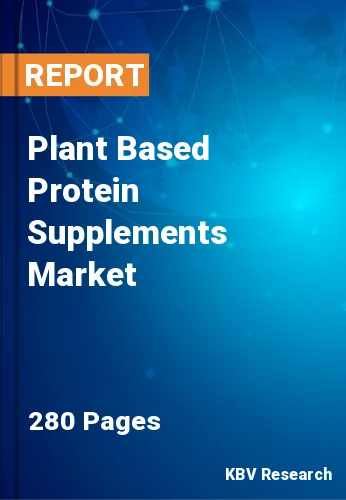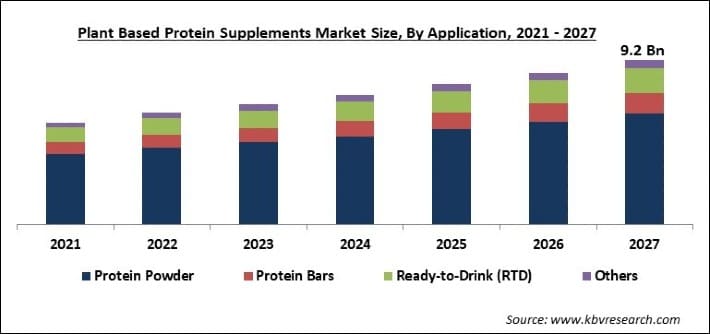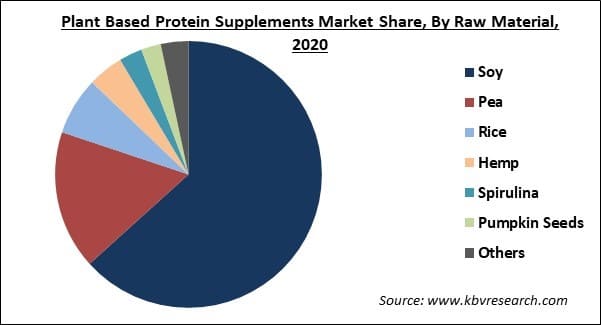
The Global Plant-based Protein Supplements Market size is expected to reach $9.2 billion by 2027, rising at a market growth of 8.4% CAGR during the forecast period. Protein-based protein supplement products refer to the Protein supplements that are processed and extracted from various kinds of nutritional plant sources. Some of the main plant-based sources used as key ingredients for plant protein supplements include chickpea, soy, brown rice, pea, and others.
The growth of the plant-based protein supplement market would be fueled by the increasing popularity and adoption of the vegan diet due to the risk of cardiovascular diseases and type-2 diabetes because of consuming meat products. In addition to it, the growing population of flexitarians, owing to the wide-scale awareness programs that promote vegan diet media platforms is expected to create new growth avenues for the market player in the plant-based protein supplements market over the upcoming years.

The constantly changing consumer preferences have displayed a rising shift among consumers toward choosing a nutritional diet centered towards a highly nutritious diet centered towards a sustainable lifestyle and less dependency on animal proteins. A substantial portion of the millennial population in Western countries has been witnessed about their changing food trends as consumers move from traditional animal-based products to organic and plant-based food products as a perfect food solution. In the last couple of years, the acceptance of plant-based food & beverages among consumers have been significant because of the wider scope of product accessibility, higher product advancements, and innovation into plant-based proteins, and a wider scope of available alternatives and substitutes.
The plant proteins sector has been booming at increasing the challenge. The absence of conventional meat alternatives on grocery store shelves displays an innovative opportunity to speed up the deployment of plant-based protein supplements in the next few years. For the past few years, the meat processing sector is expected to decrease as some big meat processing organizations like Tyson and Smithfield plant closures because of the outbreaks of the COVID-19 pandemic. There is a significant potential meat shortage looming. Consumers are willing to opt for plant-based protein supplements as the key meat manufacturers have witnessed a hard hit during these times.
The demand for plant proteins has fueled majorly owing to the disturbances of the conventional protein supply chain; though, which will not majorly decrease animal-based protein. Once the situation starts to regularize, out-of-home consumption will rise again. The meat processing sector will also revive like a pre-pandemic state. These things will again cut down the abrupt increment in sales to some extent. In such a scenario, there is a high need that plant protein manufacturers should re-design their sourcing strategies, promote their product offerings, and harness the supply chains' capability and their route-to-market channels. E-commerce and distribution networks should be optimized and streamlined. In addition to it, taking into account the impact of changing commodity costs and other costs-to-serve and rising demand, organizations will be compelled to redesign their costing and promotion strategies.
Based on Product, the market is segmented into Protein Powder, Protein Bars, Ready-to-Drink (RTD) and Others. The bars segment would exhibit a substantial growth rate throughout the forecast years. The demand for ready-to-eat snacks and healthy alternatives like bars would be fueled by the high adoption of fast-paced & hectic lifestyles along with consumer preference for healthier snacking options and the trend of on-the-go snacking.
Based on Raw Material, the market is segmented into Soy, Pea, Rice, Hemp, Spirulina, Pumpkin Seeds and Others. The soy segment garnered the maximum share of the plant-based protein supplement market in 2020. Soy protein supplements are obtained from soybeans which is one of the very few plant sources that provide a complete package with all the nine crucial amino acids.

Based on Distribution Channel, the market is segmented into Online Stores, Supermarket and DTC & Others. Supermarkets or mass retailers acquired a significant revenue share of the global sales of protein products in 2020. Key retailers in the U.S., such as Walmart, are entering into the market and are putting heavy investment in private label variants to accelerate the sales of the product. On the other hand, the high competition from other distribution channels like online stores and DTC channels would decline the growth rate of retail sales in the next few years.
Based on Application, the market is segmented into Sports Nutrition and Additional Nutrition. Additional nutritional segment garnered a significant revenue share of the overall market in 2020. Growing consciousness about the advantages of a balanced and nutrient-rich diet and regular exercise with an aim to keep an ideal body weight is boosting the demand for additional nutritional supplements, recommended by medical practitioners or doctors.
| Report Attribute | Details |
|---|---|
| Market size value in 2020 | USD 5.1 Billion |
| Market size forecast in 2027 | USD 9.2 Billion |
| Base Year | 2020 |
| Historical Period | 2017 to 2019 |
| Forecast Period | 2021 to 2027 |
| Revenue Growth Rate | CAGR of 8.4% from 2021 to 2027 |
| Number of Pages | 280 |
| Number of Tables | 480 |
| Report coverage | Market Trends, Revenue Estimation and Forecast, Segmentation Analysis, Regional and Country Breakdown, Companies Strategic Developments, Company Profiling |
| Segments covered | Product, Raw Material, Distribution Channel, Application, Region |
| Country scope | US, Canada, Mexico, Germany, UK, France, Russia, Spain, Italy, China, Japan, India, South Korea, Singapore, Malaysia, Brazil, Argentina, UAE, Saudi Arabia, South Africa, Nigeria |
| Growth Drivers |
|
| Restraints |
|
Based on Regions, the market is segmented into North America, Europe, Asia Pacific, and Latin America, Middle East & Africa. In 2020, North America emerged as the leading region in the plant-based protein supplement market. The region is currently witnessing a high level of awareness regarding the vegan diet combined with a switching trend towards vegetarianism due to new brand programs on social media and television channels that would accelerate the plant-based protein supplements in the next few years.
Free Valuable Insights: Global Plant Based Protein Supplements Market size to reach USD 9.2 Billion by 2027
The market research report covers the analysis of key stake holders of the market. Key companies profiled in the report include Glanbia PLC, AMCO Proteins, Quest Nutrition LLC (Atkins Nutritionals Holdings, Inc.), NOW Foods, Inc., Danone S.A., MusclePharm Corporation, Abbott Laboratories, PepsiCo, Inc., Alticor Inc. (Amway Corporation), and Kerry Group PLC.
By Product
By Raw Material
By Distribution Channel
By Application
By Geography
The global plant based protein supplements market size is expected to reach $9.2 billion by 2027.
Growing demand for food & beverages containing organic ingredients are driving the market in coming years, however, allergies related to plant-based protein sources limited the growth of the market.
Glanbia PLC, AMCO Proteins, Quest Nutrition LLC (Atkins Nutritionals Holdings, Inc.), NOW Foods, Inc., Danone S.A., MusclePharm Corporation, Abbott Laboratories, PepsiCo, Inc., Alticor Inc. (Amway Corporation), and Kerry Group PLC.
The expected CAGR of the plant based protein supplements market is 8.4% from 2021 to 2027.
Consumers are willing to opt for plant-based protein supplements as the key meat manufacturers have witnessed a hard hit during these times.
The protein powder segment garnered the highest revenue share of the plant-based protein supplement in 2020. This is due to the wide-scale consumption among gym professionals.
Our team of dedicated experts can provide you with attractive expansion opportunities for your business.
